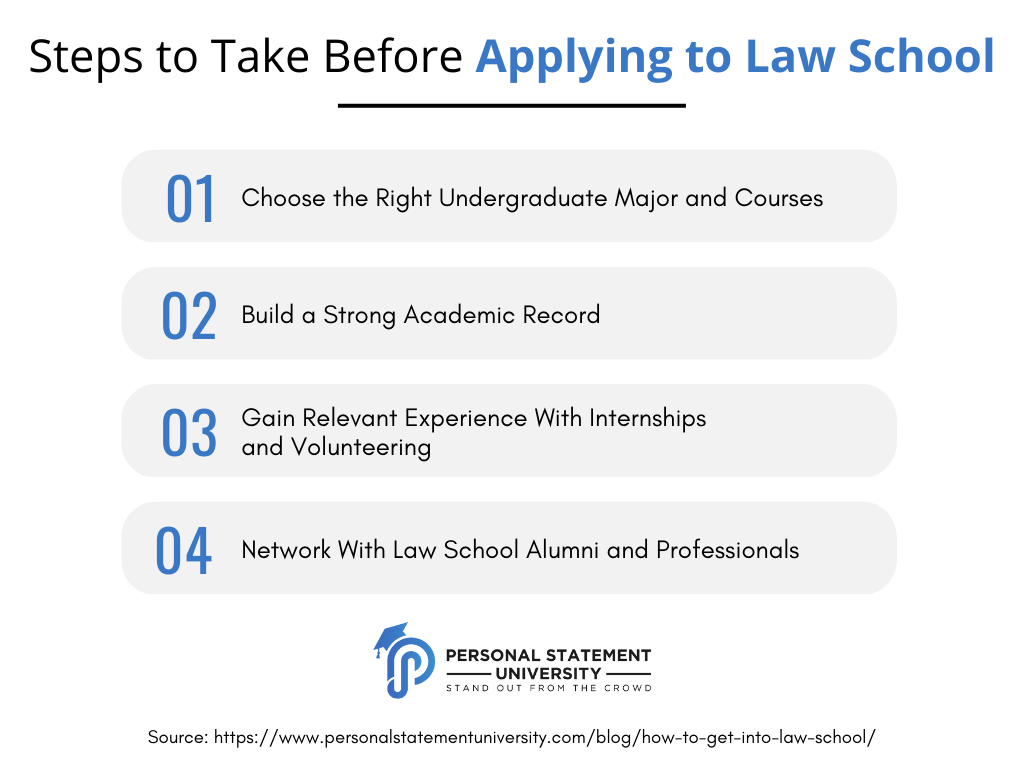How to Get into Law School?

To get into law school, ace the LSAT, and maintain a high GPA. Gather strong letters of recommendation and compose a compelling personal statement.
Securing a place at a reputable law school requires a blend of academic achievement, strategic preparation, and a demonstration of potential. As an aspiring law student, your journey begins with a rigorous undergraduate education, where maintaining a stellar grade point average becomes paramount.
How to Get into Law School? Preparing for the Law School Admission Test (LSAT) is another critical step, demanding dedicated study to ensure a score that stands out. Beyond these metrics, your application must showcase your unique attributes and commitment to the legal field. Letters that vouch for your character and intellect, a personal statement that echoes your passion and reasons for pursuing law, and relevant extracurricular involvement, all paint a picture of who you are and the lawyer you aspire to become. Crafting an application that reflects a balance between academic prowess and personal development is the key to opening the doors of your desired law school.

Credit: www.personalstatementuniversity.com
The Pursuit Of Legal Education
A journey into law begins with a profound step towards understanding the intricate fibers of justice and society. Future legal eagles seek the tools and knowledge to make impactful changes. This is a path marked by dedication, precision, and a deep passion for upholding the law.
Why Choose A Career In Law
Choosing a career in law goes beyond the appeal of a prestigious profession. It calls to those who desire:
- Impact: Creating significant changes in people’s lives and society.
- Critical Thinking: Developing the skill to analyze complex information.
- Diverse Opportunities: Working across various sectors and specializations.
The Role Of A Law School In Your Legal Journey
Law school is a critical milestone for aspiring lawyers. It provides the educational foundation you need. Here’s what you gain:
| Role of Law School | Your Benefits |
|---|---|
| Knowledge Acquisition: | Understand laws, legal systems, and procedures. |
| Skills Development: | Learn legal writing, research, and argumentation. |
| Networking: | Meet mentors, peers, and legal professionals. |
The learning environment challenges students to think like lawyers. It paves the way to become adept practitioners.
Preparing For Law School Admission
Embarking on a journey to law school demands careful preparation. To secure a coveted spot, aspiring law students must demonstrate exceptional academic credentials and a solid foundation in relevant coursework. This section sheds light on the critical steps needed to ensure applicants stand out in the competitive law school admissions process.
Academic Prerequisites And Performance
Earning admission to law school requires more than just a desire to become a lawyer. Strong academic results form the backbone of a successful application. Law schools closely review an applicant’s GPA and LSAT scores to gauge their potential. Let’s delve into the key factors that can make a significant difference:
- GPA: A high-grade point average showcases dedication and intellectual capability. Aim for a minimum of 3.0, but the closer to 4.0, the better.
- LSAT: The Law School Admission Test measures skills vital for law studies. A score in the 75th percentile or above boosts admissions chances.
- Academic Honors: Achievements like honor roll or dean’s list recognition add weight to your application.
Selecting The Right Undergraduate Courses
Choosing undergraduate courses wisely is pivotal for law school success. The right courses develop skills that are essential in legal studies. Aim for a diverse curriculum:
| Course Type | Skills Developed |
|---|---|
| Humanities | Critical thinking, analysis |
| Social Sciences | Understanding societal structures, logical reasoning |
| Writing-Intensive | Clear communication, argument construction |
| Research-Based | Data gathering, synthesis |
While a specific major is not required for law school, engaging in courses that challenge and improve critical thinking, communication, and research skills will provide a solid educational foundation and make a strong impression on admissions committees.
The Importance Of Lsat
Embarking on a legal career journey, the LSAT stands as a pivotal milestone. This key exam often serves as the primary measure of a candidate’s potential for law school success. Law schools heavily weigh LSAT scores, making them a crucial component of the admissions process. A strong LSAT score can open doors to prestigious programs and scholarships, setting the stage for a successful legal career.
Understanding The Lsat
The LSAT, or Law School Admission Test, assesses skills vital for law scholars. Critical reading, analytical reasoning, and logical thinking form the test’s core. The exam includes multiple-choice questions and a writing sample. Scoring well proves to legal programs a candidate’s readiness to tackle rigorous studies.
- Reading Comprehension: Tests ability to understand complex texts.
- Analytical Reasoning: Measures the ability to understand a structure of relationships.
- Logical Reasoning: Assesses the ability to analyze and evaluate arguments.
- Writing Sample: Displays the candidate’s ability to construct a persuasive argument.
Strategies For Lsat Preparation
To ensure an LSAT score that reflects one’s best abilities, comprehensive preparation is essential. Here are strategies to guide prospective students:
- Knowing the test format: Familiarize yourself with question types and timing.
- Practice exams: Regularly take timed practice tests to build endurance and speed.
- Review and analyze: After each practice test, review answers to identify weaknesses.
- Targeted practice: Focus on areas needing improvement with tailored exercises.
- Expert guidance: Consider prep courses or tutors for structured learning.
- Consistent study schedule: Dedicate time daily to LSAT studies.
| Preparation Area | Strategy |
|---|---|
| Understanding Concepts | Review foundational material before attempting practice questions. |
| Time Management | Practice sections with a timer to improve speed and accuracy. |
| Mental Stamina | Take full-length, timed tests to build endurance for the actual exam. |
Starting early and maintaining a disciplined approach to studying will give you a competitive edge. Utilize all resources available to master the LSAT and secure your place in law school.
Crafting Your Application
Embarking on the law school journey demands precision and clarity in crafting your application. A standout application showcases your qualifications and dedication to the legal profession.
Personal Statement Dos And Don’ts
A personal statement forms the heart of your application. It reflects your voice and commitment. Here’s how to make it shine:
- Do focus on clarity and structure.
- Do emphasize unique experiences.
- Do demonstrate legal passion.
- Don’t use clichés or legalese.
- Don’t exceed the word limit.
- Don’t submit without proofreading.
Letters Of Recommendation: Whom To Ask
Strong letters of recommendation are pivotal. Choose recommenders wisely:
| Recommender Type | Reason to Choose |
|---|---|
| Professors | Academic insight and your capabilities. |
| Employers | Professional skills and work ethic. |
| Mentors | Personal development and potential. |
Ensure the recommenders know you well. Give them ample time to write. Always express gratitude for their support.
Selection Of Law Schools
The journey to becoming a lawyer begins with picking the right law school. The selection process can shape your legal career. Let’s break down how to make an informed decision and find the best fit for your aspirations.
Factors To Consider When Choosing A School
Choosing a law school demands careful thought. Focus on key factors that align with your goals. Evaluate each institution by delving into the following aspects:
- Reputation: Research rankings and alumni success.
- Location: Consider the school’s setting and your comfort there.
- Areas of Specialization: Seek programs matching your interests.
- Cost: Analyze tuition, scholarships, and financial aid options.
- Campus Culture: Ensure the environment supports your growth.
- Job Placement Rates: Check stats for post-graduation employment.
Think about long-term impact, such as bar passage rates and network reach.
Applying To Multiple Schools: Pros And Cons
Applicants often ponder the idea of applying to several schools. Weighing the advantages and challenges is critical.
| Pros | Cons |
|---|---|
| Increases admission chances | Can become costly with application fees |
| Offers multiple options for selection | Requires more time and effort to tailor each application |
| Allows for comparing various financial aid offers | May lead to decision fatigue when choosing |
Apply to a mix of reach, match, and safety schools. This strategy can maximize your potential outcomes. Be mindful of time and resources as you apply.

Credit: www.juriseducation.com
Navigating Financial Considerations
One of the biggest hurdles to jump over on your way to law school is understanding the costs. Law school is an investment in your future. But before reaping the rewards, you must navigate the financial considerations. Smart planning can make this journey smoother. Let’s dive into what you need to know about tuition and finding financial support.
Understanding Tuition And Associated Costs
Law school tuition can seem daunting. It’s not just about the classes. Books, living expenses, and fees add up. Knowing these costs upfront helps you prepare:
| Cost Type | Description | Average Cost |
|---|---|---|
| Tuition | Classes and academic services | $20,000-$50,000/year |
| Books | Textbooks and materials | $1,000-$3,000/year |
| Living Expenses | Rent, food, and transportation | $10,000-$20,000/year |
| Other Fees | Technology, activities, insurance | $2,000-$5,000/year |
Costs vary by institution and location.
Finding Scholarships And Financial Aid
You don’t have to bear the cost burden alone. Scholarships and financial aid are lifelines. They can help cover tuition and more. Here’s how to find them:
- Visit your school’s financial aid website.
- Look for law-specific scholarships.
- Apply to both merit-based and need-based aid.
- Search for external scholarships on databases.
- Check with local bar associations for awards.
- Contact firms or organizations that sponsor students.
Fill out the FAFSA form early for federal student aid. Many schools also use this data for their aid packages. Scholarships often have early deadlines, so start searching now!
Gearing Up For Success
Are you dreaming of a future in the legal field? Getting into law school is your first big step. This journey demands dedication, hard work, and strategic preparation. Let’s explore the best ways to gear up for success and set the foundation for a thriving legal career.
Embracing The Rigors Of Law School
Preparedness for the workload in law school is crucial. It’s about more than just reading; it’s understanding complex concepts and crafting arguments. To excel, foster a strong work ethic and embrace the challenge ahead.
- Create a study schedule that includes ample time for each subject.
- Join study groups to engage with the material collaboratively.
- Seek resources like tutoring and academic workshops.
Developing Essential Skills For Law Students
Success in law school hinges on certain core skills. Developing these early on will give you an edge.
| Essential Skill | Tips for Development |
|---|---|
| Critical Thinking |
|
| Time Management |
|
| Writing Clarity |
|
| Oral Communication |
|
Develop these skills through practice and persistence. Your law school journey will be demanding, but with the right tools and mindset, success is within reach. Start your preparations today and build a strong foundation for your legal career.

Credit: bemoacademicconsulting.com
Conclusion
Embarking on a legal education journey requires determination and strategic planning. A solid GPA, impactful LSAT scores, and compelling personal statements form the trifecta of a strong law school application. Remember, recommendations and extracurriculars can distinguish you further. Stay focused, seek guidance, and your dreams of law school are well within reach.
Success awaits those who persevere—your gavel is closer than you think.
Introducing Jonah Plum, a legal luminary whose journey through the corridors of justice has been intertwined with the eloquence of the written word. Born and raised in the vibrant city of Seattle, Washington, Jonah's early fascination with language and debate laid the foundation for a remarkable career in law.
Jonah's scholarly odyssey began at Harvard Law School, where they immersed themselves in the study of jurisprudence, honing their analytical prowess and legal acumen. Armed with a law degree, they entered the legal arena, navigating courtrooms and boardrooms with a fervor for justice. Yet, it was the realization of the transformative power of the written word that led Jonah to pivot from legal briefs to the world of blogging.
A digital advocate in the truest sense, Jonah recognized the need for demystifying legal concepts and making them accessible to a broader audience. This blog, a virtual repository of legal insights, transcends geographical boundaries, connecting with a global readership hungry for clarity amidst legal complexities.
Beyond the black letter of the law, Jonah delves into the human stories that underscore the legal landscape. Their writing goes beyond legal analysis, weaving narratives that humanize the law, shedding light on its impact on individuals and society.






